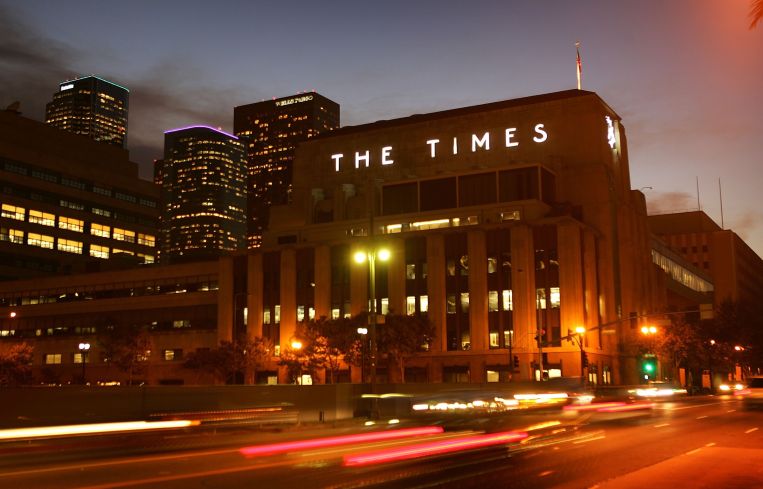Los Angeles Times to Relocate HQ to El Segundo Under New Ownership
By Alison Stateman April 17, 2018 4:32 pm
reprints
The Los Angeles Times will be relocating from its historic Art Deco headquarters in Downtown Los Angeles to 2300 East Imperial Highway in suburban El Segundo in the South Bay come June, according to Patrick Soon-Shiong, the physician-turned-biotech-billionaire who reached a deal to buy the newspaper, along with its sister publication The San Diego Tribune, from parent company Tronc for $500 million in February. Soon-Shiong announced the relocation during his first town hall meeting with staff last Friday, saying that he wanted to invest in creating a modern newsroom not “to lease a building,” according to the L.A. Times.
The lease for the Times’ newsroom and business administration at 202 West 1st Street, where the paper has operated since 1935, expires on June 30, the L.A. Times reported. Soon-Shiong told employees that Onni Group, which owns the building, was demanding a rent increase of $1 million a month to remain. Previous owner of the newspaper (The Tribune Company, now known as Tronc) had sold the iconic building along with two other properties for $430 million to the Canadian real estate developer in 2016.
At the time of the sale, the L.A. Times reported that Onni was said to be mulling converting the building designed by George B. Kaufman into a collection of creative offices, shops and residential units. The acquisition of the 912,634-square-foot L.A. Times campus, a mix of five interconnected structures that fill an entire city block, was seen as a significant gain for Onni, which had been on a buying spree in Downtown L.A., where it owns several other properties, including the Western Pacific building at 1023 Broadway.
Onni did not return Commercial Observer’s calls for comment. However, the move is a done deal, with the developer already listing the property under “LA Times Campus” as available come July 1, 2018. A spokesperson for Soon-Shiong, meanwhile, told the L.A. Times this week that the organization would relocate permanently sometime before the end of June, when the lease in downtown expires. Employees will move into a 120,000-square-foot building already on the site, at the intersection of Imperial Highway and North Douglas Street.
Instead of spending an extra $12 million a year on rent, Soon-Shiong told assembled staff he wanted to invest in hiring more journalists, improving technology in the newsroom and fashioning a modern campus with amenities and free parking.
The L.A. Times plans to keep some office space Downtown for reporters and others whose assignments require them to be Downtown, though exact details were not forthcoming.
The new El Segundo campus will be built on roughly 4.5 acres owned by Soon-Shiong, and will include an eight-floor building with 120,000 square feet of space. A museum gallery of the newspaper’s 136-year history will be housed on the first floor, along with event and retail space.
Teams of construction workers and architects are on the site trying to get the building completed in time, “working 24/7, literally through the night,” Soon-Shiong said in an interview after the town hall with staff.
Soon-Shiong’s wife, Michele B. Chan, a former actress and philantrophist, is leading the design of the space. Two local architecture firms—Tichenor and Thorp in Century City and CO Architects in the Mid-Wilshire neighborhood—have been hired to do the buildout.
Soon-Shiong has been establishing a presence in El Segundo, opening the Chan Soon-Shiong Institute for Medicine last year at 2040 East Mariposa Avenue, as the Daily Breeze reported, just down the street from the future training center of the Los Angeles Lakers, a team in which Soon-Shiong holds a minority ownership interest.



